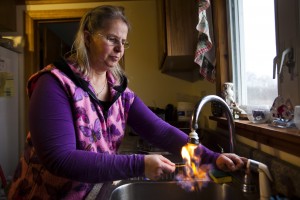New Methane Study Examines Leaks At The Source
-
Katie Colaneri

EPA/JIM LO SCALZO /LANDOV
Sherry Vargson, who leased the mineral rights under a portion of her farm to the gas company Chesapeake Energy, illustrates her assertion that methane has leached into her well water by lighting the water on fire as it pours from her kitchen sink in Granville Summit.
Part one of a major new study on methane emissions from natural gas drilling shows encouraging, albeit mixed results at one end of the supply chain: production.
“Some emissions were much lower than we expected,” said the study’s lead author David Allen from the University of Texas in a video summarizing the research. “Some were a bit higher than we expected. Others we found we needed to collect a lot more information.”
Methane is a main component in the fossil fuel and a powerful greenhouse gas that burns cleaner than coal, but traps far more heat than carbon dioxide. Concerns about methane migration during fracking have bolstered critics of the drilling technique and put the industry on the defense.
The new study found that emissions during the well completion phase (the process of getting a well ready for production) were much lower than projected, while gas leaks from valves and other equipment on well pads were much higher.
“So the study can act as a compass to direct us towards the types of emission reduction activities that will yield the greatest benefit,” Allen said.
The findings, published today in the Proceedings of the National Academy of the Sciences, fall in line with the Environmental Protection Agency’s estimates released in April.
More from the Associated Press:
The study found that during the process of extracting natural gas from the ground, total leakage at the study sites was 0.42 percent of all produced gas. That is a bit less than what the EPA suggested is the national average. The U.S. produced 24.1 trillion cubic feet of natural gas in 2012, so that means about 101 billion cubic feet of methane leaked into the air during the first stage of production. Additional leaks occur in the second half of the process: delivery from wells to homes and power plants.
Other researchers have found much higher levels of methane emissions, including a controversial study by Robert Howarth at Cornell University. In 2011, Howarth concluded that natural gas is worse than coal when it comes to its impact on global warming. StateImpact Pennsylvania has previously reported that the state Department of Environmental Protection attempted to keep Howarth’s study out of a report on climate change that has yet to be released.
Howarth told the Associated Press that the University of Texas study offers “good news,” but could just be the “best-case scenario.”
The 16-part study is sponsored by a number of energy companies and the Environmental Defense Fund and is the first to measure methane leaks at the source, rather than downwind of drilling sites. Researchers will continue to evaluate emissions at other stages of the natural gas production process from production wells to consumers’ homes.
















